Your Guide to SEO Strategies of Leading Recruitment Agencies
Unlocking the SEO Secrets: Your Playbook for Success
In the 21st century, where new information flows every second, one thing remains clear: search engine optimisation (SEO) is the lifeblood of online visibility, including digital marketing for recruitment. From multinational corporations to local startups, organisations are all vying for the coveted top spots in search engine results pages (SERPs). Recruitment agencies, in particular, face fierce competition in the digital realm as they strive to connect the right talent with the right opportunities. To rise above the noise, any agency worth its salt, must master the art and science of SEO.
In this comprehensive exploration, we’ll dissect the strategies and tactics employed by top recruitment agencies in key professional services sectors. We’ve handpicked agencies that are not simply achieving a ranking, but are dominating the search engine results pages and delivering results. Then, we'll empower you with the knowledge and tools needed to replicate their success and carve your own path toward SEO excellence.
The Significance of SEO in Recruitment
In the employment landscape, job seekers and employers alike have turned to the internet as their primary resource for connecting and filling vacancies. Whether it's a highly specialised role in the tech industry or an executive position in finance, the journey always begins with a simple Google search. As and, for recruitment agencies, establishing a prominent ranking prominently in search engine results is critical. Ranking high in SERPs means more clicks, more organic traffic, and ultimately, more successful placements.
But this is a twofold task, as the competitive nature of recruitment means that agencies must consistently attract both job seekers and employers to their platforms. This is where good SEO comes into play. Good SEO is not just about visibility; it's about the quality of that visibility.
Looking into the tactics of Leading Recruitment Agencies
Throughout this guide, we'll delve into the digital strategies employed by some of the most influential recruitment agencies in key professional services sectors, mastering SEO for recruitment agencies. By identifying the secrets of their success we’ll explain how they consistently secure top rankings in the fiercely competitive world of online recruitment.
Then we'll take you behind the scenes to understand how these agencies optimise their websites, create compelling content, and leverage backlinks to gain authority and credibility. Together, we will unravel the mysteries of SEO, celebrate the successes of top recruitment agencies, and equip you with the knowledge and tools to make your mark in the digital world of talent acquisition. So, fasten your seatbelts, and let's embark on this exciting journey into the world of SEO excellence in recruitment!
This guide is your essential companion to unraveling SERPs within the recruitment industry, so let’s start with looking at examples in Engineering Recruitment.
Sector: Engineering Recruitment
Keyword: Engineering Recruitment Agency
‘Engineering Recruitment Agency’ is a good term for this sector with over 700 monthly searches likely to be from a combination of both candidates and clients.
Here is the Search Engine Results Page (SERP) for this term based on AH Refs data
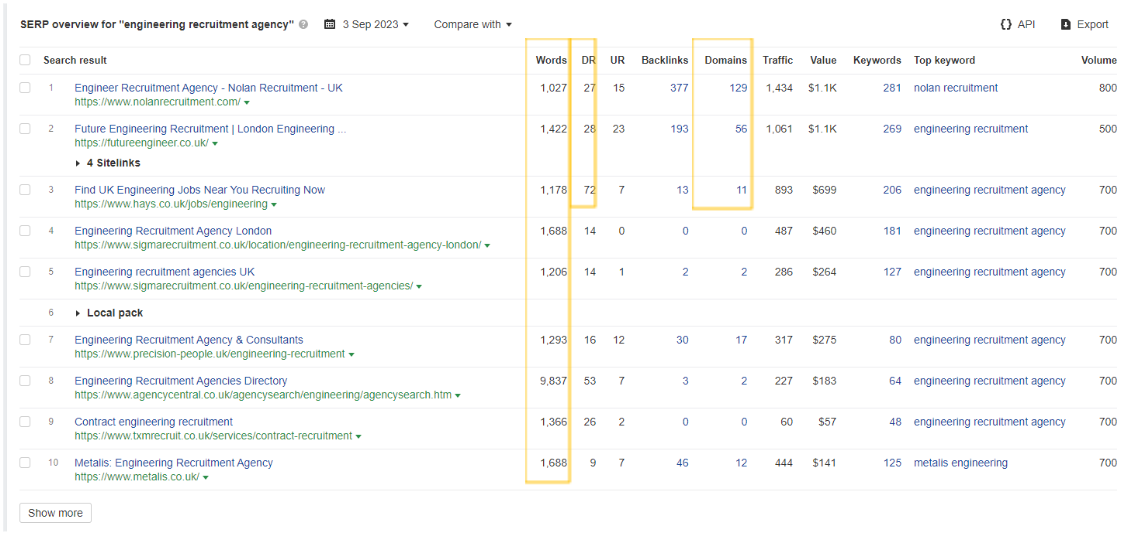

.png?width=500&height=500&name=Stonor%20White%20(1).png)


One of the key aspects we review here is the first page companies Domain Ratings (DR)
Domain Rating (DR) is a metric used in the field of SEO to assess the overall authority and strength of a website's domain. It is typically measured on a scale from 0 to 100, with higher scores indicating a stronger and more influential domain.
A website's DR is influenced by various factors, including the quality and quantity of backlinks it has from other reputable websites. In essence, a higher DR suggests that a website is more likely to rank well in search engine results pages and is considered a trustworthy and authoritative source of information in its niche.
For recruitment agencies and other businesses aiming to improve their online visibility, understanding DR is crucial. It helps gauge the competitiveness of your website in the SEO landscape and offers insights into areas that may require improvement to enhance your domain's authority and ultimately achieve higher search engine rankings.
As you can see, Hays has a very high DR as a market leader with a very powerful website. More localised or smaller agencies have lower level of DR. Often, search results only have high DR websites in them, and this can make it very hard to compete. In this case, we can see the lowest level DR is 9 which is quite low for such a strong term. This suggests a website with a higher DR would have a chance of ranking in this pack. Of course, there are more factors at play here that would need to be in place to enable your agency to compete.
You’ll note each page has a word count of at least 1000 words.
Only two of the pages have 0 referring domains (domains linking back to the website) and all have some good organic traffic activity.
So, let's take a closer look at the top slots and the assets what these sites have that are enabling them to rank on page one.
Why is HAYS position 3?
- DR 72 - very powerful site built over many years.
- 3,800 referring domains to their site
- Listing 1515 engineering related jobs on its own website i.e. the content lives on its own domain - not a partner’s domain. That is a lot of engineering related content!
- Publishing optimised blogs daily across core areas
- Produced focused pages for each industry.
- Dedicated deep content areas for client and candidates.
- Solid brand with experience and very well aged domain with good EAT principles.
Results:
Ranking for 56,000 keywords across many sectors!
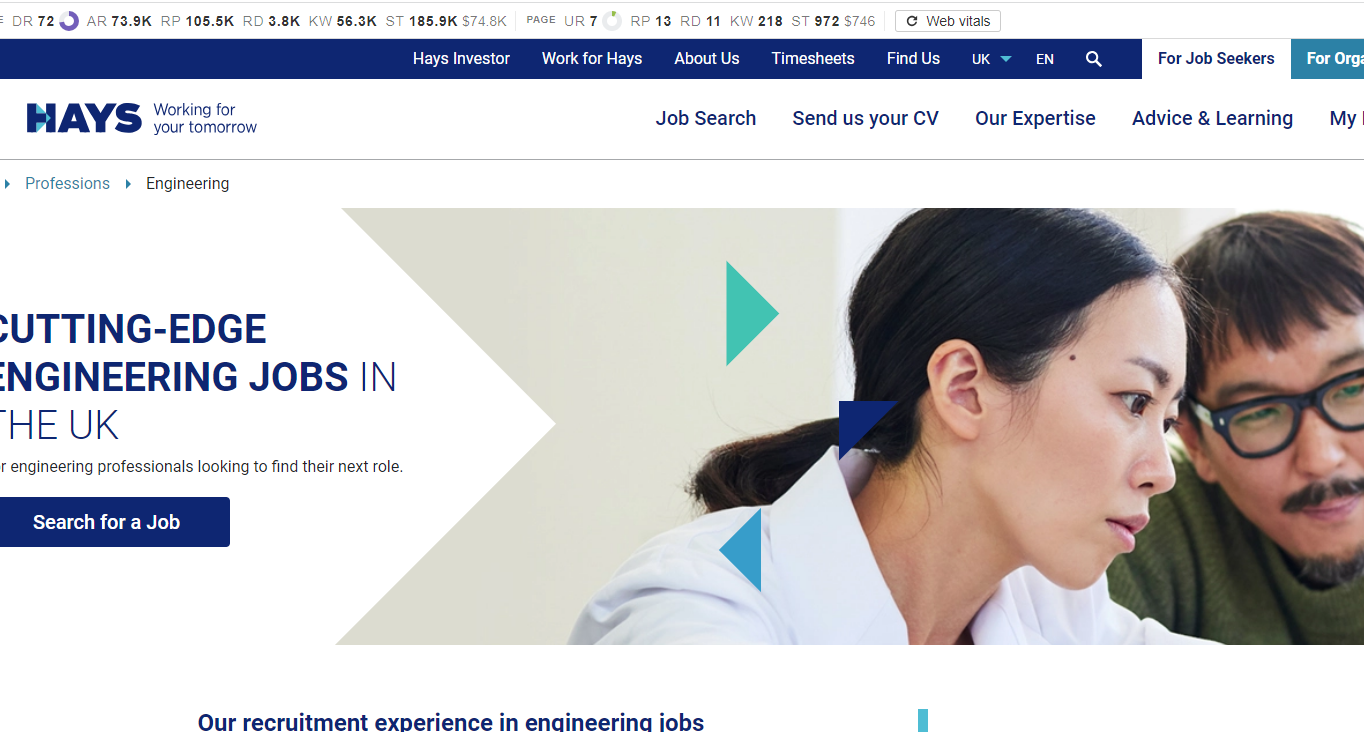
Industry pillar pages created for each core vertical
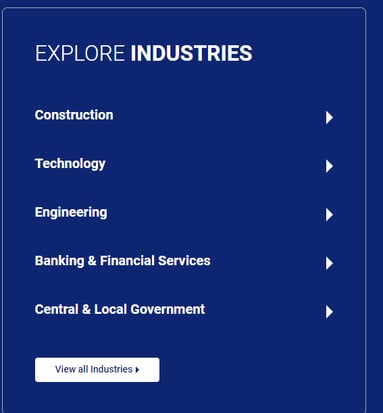
Hays Recruitment Engineering Webpage
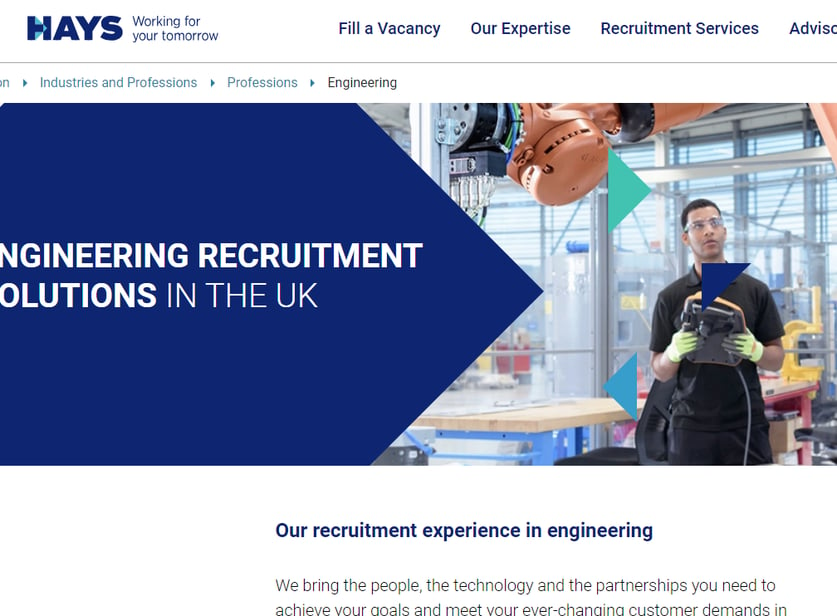
Professions are explored with pillar pages for core professions:
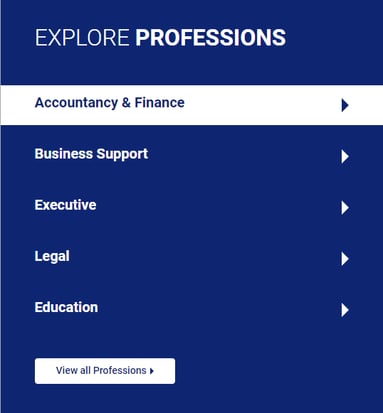
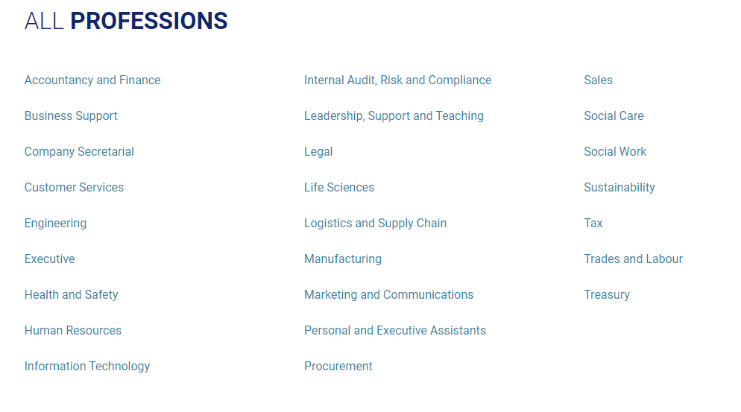
Highly engaging content that enables right fit prospects to engage with the company even if they are not ready to apply for a job yet.

So, how have they been beaten to the number 1 slot by Nolan.com, a smaller independent agency with a lower DR?
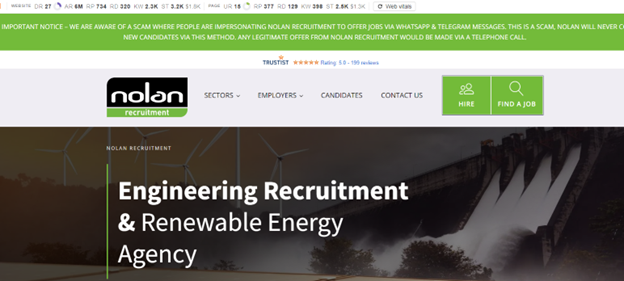
Here is a quick rundown:
- Nolan recruitment have nailed their specialism!
- Lower overall DR of 27 but they have some other factors in their favour
- Nolan have dedicated their home page to optimising this term which shows the company is dedicated to the sector
- This means it's more likely to compete with its home page referring domains totalling 129 domains linking to the home page specifically
- 75 of these links are minimum of DR20 and upwards with 40 over DR40 according to AH Refs data - this lends power to the website by association!
Why are the links so important?
Search engines like Google consider backlinks (links from other websites to yours) as "votes of confidence." When reputable and authoritative websites link to your agency's website, it signals to search engines that your content is valuable and trustworthy. This, in turn, enhances your website's authority and credibility in your industry or niche, making it a key strategy for a marketing agency for recruitment agencies.
Search engines use complex algorithms to determine the relevance and quality of web pages when ranking them in search results. Backlinks are one of the most influential ranking factors. Websites with a robust backlink profile tend to rank higher in search results, making it easier for potential clients and candidates to find your agency. Crucially, if you have more highly relevant, high-powered sites linking back to your content vs your competition, you will have a stronger chance of ranking higher in SERPs.
What else is helping Nolan get ranking results?
- Nolan's whole site is specialised to the engineering sector which gives them advantage over larger higher DA/DR sites that have less content on the subject matter.
- Engineering sub sectors covered by core pillar pages dedicated to the subject.
- Good Trustworthiness from Trustist ranking with 201 reviews aligning nicely with core Google EAT principles
Why is trust important? What is EAT?
Google EAT, which stands for Expertise, Authoritativeness, and Trustworthiness, is a set of quality guidelines used by Google's algorithms to assess the credibility and reliability of web pages and websites. EAT is particularly significant for websites that provide information related to health, finance, and other critical topics, but it applies broadly to content across the web.
Here's a brief explanation of each component of EAT:
Expertise
Google evaluates whether the content on a webpage is authored by experts or individuals with relevant knowledge in the field. High-quality content is expected to come from authors or sources with expertise in the subject matter.
Authoritativeness
Authoritativeness considers the reputation of the website or the author of the content. Websites with a strong track record for providing accurate and reliable information are considered authoritative sources. Factors like industry recognition, awards, and mentions from reputable sources contribute to authoritativeness.
Trustworthiness
Trustworthiness assesses whether the content and the website can be trusted. Factors that contribute to trustworthiness include clear and transparent information, citations of reliable sources, privacy policies, and secure website practices (e.g., HTTPS).
Other factors supporting Nolan:
- Nolan has over 100 jobs on its sub domain all focussed on engineering sector
- Many recruitment websites allow some or all their jobs to be hosted on other domains - this reduces your content, traffic and conversion associated to your website.
- Clean simple website with easy navigation which enhances user experience.
Get your free SEO audit
In today's online-centric world, your website is essential to sales success. And if you want your website to be found, then you need a strong SEO strategy

In-depth review of your website's organic traffic
Technical and on-page SEO review
Backlink profile and competitor analysis
Review of your main competitors' websites
Why is user experience important for your recruitment website?
User Experience (UX) is a crucial factor for ranking well in search engine results, and it plays a significant role in SEO (Search Engine Optimisation) for several reasons:
Bounce Rate
Google monitors how quickly users leave a webpage after clicking on it, this is (known as the bounce rate). If users consistently bounce back to the search results shortly after visiting your site, it signals to Google that your content or site experience may not be satisfying their needs. A high bounce rate can negatively impact your rankings.
Dwell Time
Dwell time refers to the amount of time a user spends on your website after clicking through from a search result. Google uses dwell time as a signal of content quality. When users spend more time engaging with your content, it indicates that they find it valuable and relevant. Google rewards websites with longer dwell times with improved rankings.
Mobile-First Indexing
Google has shifted towards mobile-first indexing, meaning it primarily uses the mobile version of a webpage for ranking and indexing. If your website is not mobile-friendly and doesn't offer a good user experience on mobile devices, it can lead to lower rankings in search results.
Page Load Speed
Page speed is a critical UX factor. Slow-loading pages frustrate users and can lead to higher bounce rates. Google considers page speed when determining rankings. Faster-loading pages tend to rank higher because they offer a better user experience.
Navigation and Usability
A website's navigation and overall usability directly impact user experience. If visitors can't easily find the information they're looking for or if your website has a confusing layout, they are more likely to leave your site and seek information elsewhere. This can result in lower rankings due to poor user experience.
Mobile Responsiveness
With the increasing use of mobile devices, having a responsive design that adapts to various screen sizes is essential. Google rewards mobile-friendly websites with better rankings in mobile search results.
Accessibility
Accessibility is another critical component of UX. Websites that are accessible to users with disabilities not only comply with legal requirements but also provide a better experience for a broader audience. Google values websites that prioritise accessibility.
Google aims to reward websites that provide an excellent user experience because it aligns with its goal of delivering the best results to users. Websites that prioritise UX tend to have lower bounce rates, longer dwell times, and higher user satisfaction, all of which contribute to better search engine rankings. As a result, optimising your website for a positive user experience is essential for SEO success.
FutureEngineer.com has also beaten Hays to the number 2 slot! How?

- They have a much lower DR at 28 but again, many other good things are working for them
- Domain includes a core keyword
- Future Engineer has dedicated their home page to optimising this term which shows the company is dedicated to the sector
- This means it's more likely to compete with its home page referring domains of 108
- 25+ of these links are minimum of DR20 and upwards with 13 over DR40 according to AH Refs data
- Note: this is weaker than Nolan's stats which at least in part will be why they are ranking below them
- Their whole site is specialised to this sector or closely aligned industries which gives them advantage over larger higher DA sites that have less content on the subject matter or a lower level of detail.
- 15 x Engineering sub sectors covered by core pillar pages dedicated to the subject
- A blog and resources section publishing regular content specific to the sector
- Over 1000+ jobs hosted on their own domain all focussed on engineering sector
- Clean simple website with easy navigation
Okay, what about jobs keyword terms for your agency job pages? Let’s take a look for another professional service sector but this time, we’re focussing on ranking your jobs pages.
Sector: Education
Keyword: Teaching Jobs
Jobs terms can be much more competitive as you're not only up against your direct agency competition but the national job boards.
Here are the search engine results pages for 'Teaching Jobs' which is a very competitive term and has over 8,500 searches per month.
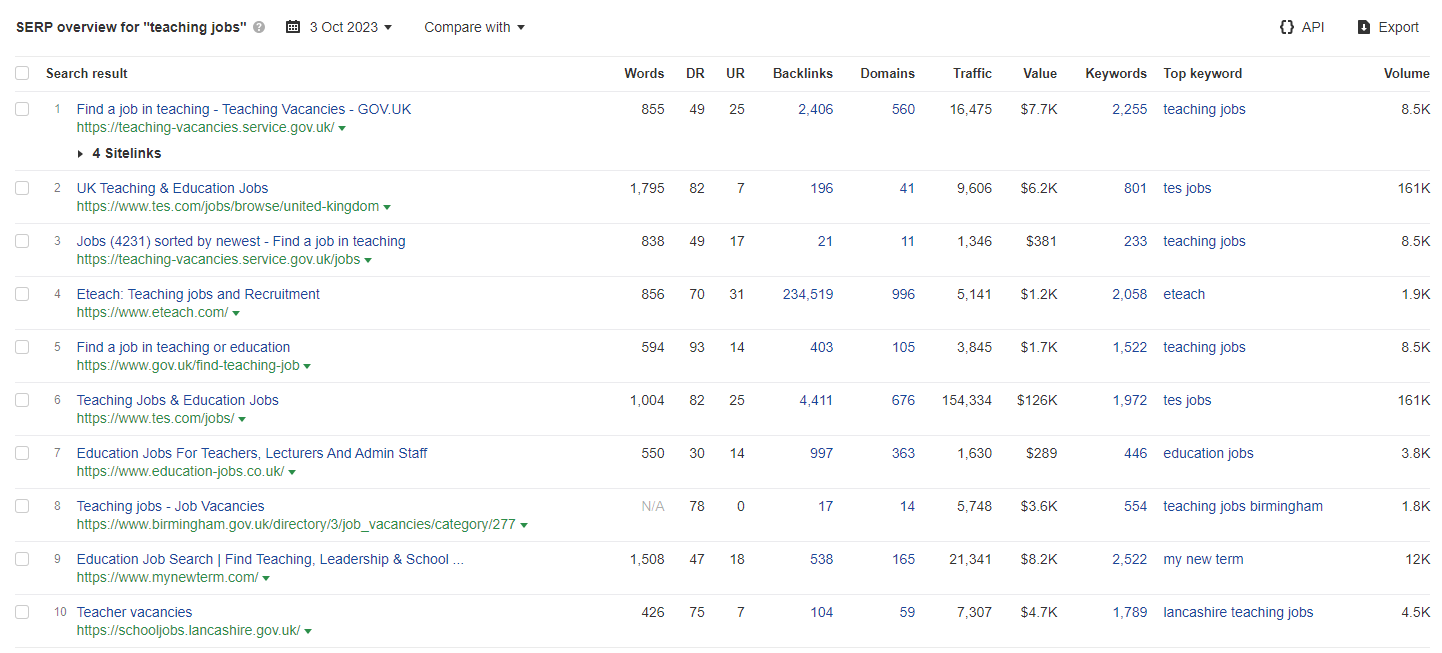
The estimated traffic value of the pages that are ranking in this space is up to an estimated £6,280. ($7,700)
Page Traffic Value is a metric that estimates the monthly organic search traffic value of a specific web page. It provides an approximation of how much it would cost to generate the same amount of traffic through paid advertising. In essence, it helps website owners understand the potential monetary value of their organic search traffic, assisting them in assessing the importance and performance of individual web pages within their site.
The lowest DR website in this result is DR 30 www.education-jobs.co.uk who are competing well for this term.
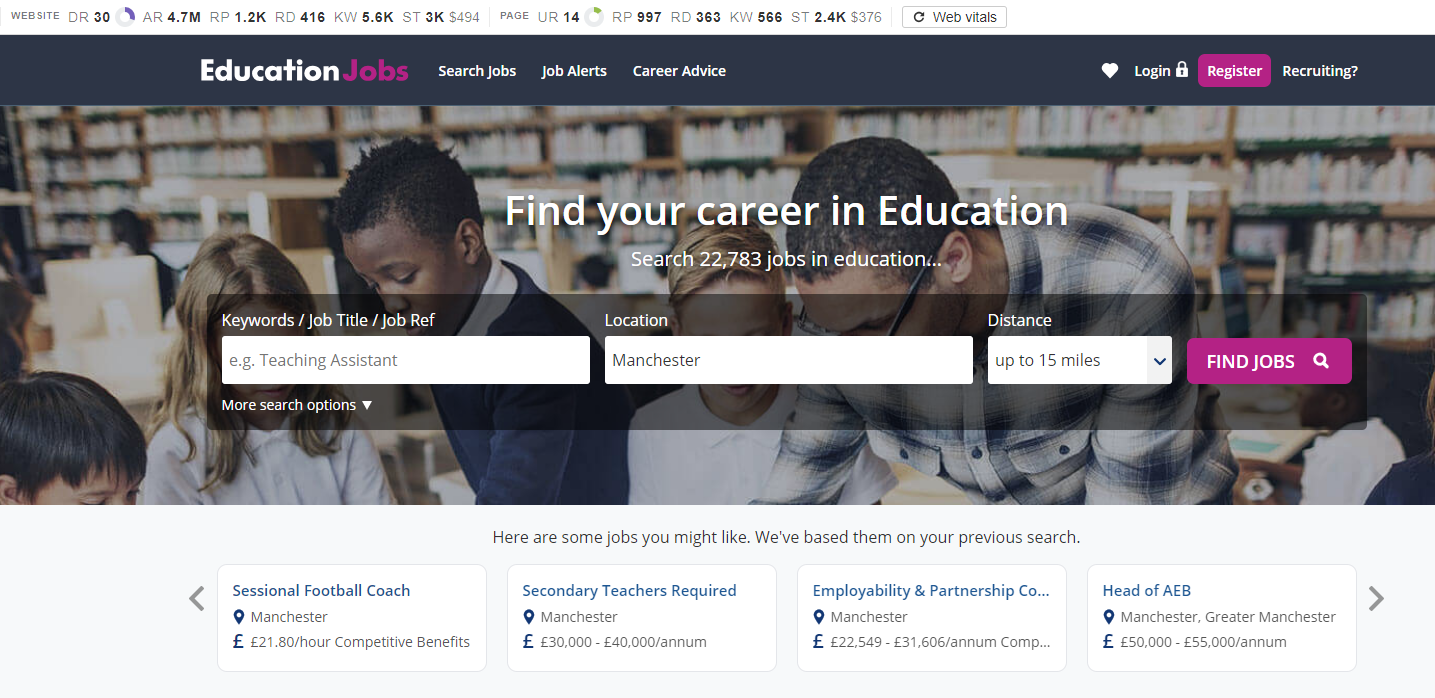
Why? On their page you will find the following:
- Huge number of jobs listed - 22,783 job listings in education
- Total focus on the education sector
- Education in the core web domain URL
- Home page real estate dedicated to education.
- 293 referring domains into the home page (130 are DR30 +)
- Note: the next lower DR website is at position 28, has a DR of 27 and has 78 referring domains with only 25 above 20 DR in power. This is having a major impact on its position in the SERPs.
- A partnership with CV library but all jobs are hosted directly on their own website i.e you do not leave their site and go to CV library.
- Jobs are listed on the top-level domain - not a sub domain or separate site.
- Broken down search page links by job type for easy searching.
- Easy UX with results quick to find
- Blog and career advice content focused on education and teaching
Why is blogging important?
Blogging is not just about churning out random articles; it's about delivering valuable, relevant, and timely content to your target audience. Here's why blogging is critical for SEO in the recruitment sector:
Freshness and Relevance
Search engines favour fresh, updated content. Regularly publishing blog posts keeps your website active and signals that you're actively engaged in your industry.
Keyword Optimisation
Blogs allow you to target specific keywords and phrases that job seekers and employers are searching for. This helps improve your visibility in search results.
Candidate and Client Engagement
Blogging offers a platform to provide insights, tips, and guidance to both job seekers and employers. Engaging content builds trust and positions your agency as an industry authority.
Long-Tail Keywords
Through blogging, you can target long-tail keywords—specific, niche phrases that often lead to more qualified traffic. For example, "Remote IT Jobs in London" is more targeted than a generic "IT Jobs."
Content Promotion
Blog posts provide shareable content for your social media channels and email newsletters, driving traffic back to your website.
Backlink Opportunities
High-quality blog content is more likely to attract backlinks from other authoritative websites, which boosts your overall SEO authority.
Answering Questions
Job seekers and employers often have questions related to the recruitment process. Blogging allows you to address these queries, becoming a valuable resource. Often times, you can go a few steps further and answer questions candidates didn’t think to ask but needed to know!
In the recruitment sector, where information and insights are highly sought after, a well-executed blogging strategy can be a game-changer. By aligning your blog topics with your topic clusters, you create a cohesive content strategy that not only enhances your SEO but also provides immense value to your audience. Topic Clusters are multiple pieces of content, grouped by a specific topic, offering value and expertise.
Good SEO can and will change your business - get ready to grow.
To compete effectively in the search engine results pages (SERPs) and establish a strong online presence in the recruitment sector, there are several key implementation requirements shouldto be considered. In this guide, we’ve analysed how smaller agencies are beating the big players and proved it’s possible with some hard work and dedication. Now it’s over to you.
Good SEO can and will change your business - get ready to grow.
To compete effectively in the search engine results pages and establish a strong online presence in the recruitment sector, there are several key implementation requirements to be considered. In this guide, we’ve analysed how smaller agencies are beating the big players and proved it’s possible with some hard work and dedication. Now it’s over to you.
Here's a summary of the key takeaways:
Analyse Your Competition:
- Study successful recruitment agencies in your niche and understand their digital strategies.
- Explore their website optimization, content creation, and backlink-building strategies.
- Identify what sets them apart and helps them maintain top rankings in competitive markets.
Understand Domain Rating (DR):
- DR is a metric used in SEO to assess a website's authority and strength.
- It's influenced by the quality and quantity of backlinks from reputable websites.
- Higher DR indicates greater competitiveness and trustworthiness in search engine rankings.
High-quality content is essential for SEO success.
- Each page should have a substantial word count (at least 1000 words) to provide valuable information to users.
Backlink Profile:
- Backlinks from authoritative websites are like "votes of confidence" and enhance your website's credibility.
- A strong backlink profile is crucial for ranking well in SERPs.
Google EAT Principles:
- Expertise, Authoritativeness, and Trustworthiness (EAT) are essential for SEO.
- Google assesses your credibility based on these principles, impacting your rankings.
Specialisation and Focus:
- Specialising in a particular sector or industry can be advantageous.
- Create pillar pages and focused content related to your specialiszation.
User Experience (UX) Matters:
- A good UX contributes to lower bounce rates and longer dwell times, both of which positively affect rankings.
- Ensure your website is mobile-friendly, loads quickly, and has intuitive navigation.
Responsive and Accessible Design:
- Adapt your website to various screen sizes, especially for mobile users.
- Prioritise accessibility to accommodate users with disabilities, aligning with Google's guidelines.
Topic Clusters and Blogging:
- Implement topic clusters by creating pillar content and cluster content around specific topics.
- Regularly publish blog posts targeting relevant keywords and providing value to your audience.
Long-Tail Keywords:
- Target long-tail keywords to capture specific, niche audiences.
- Tailor your content to address the unique needs of job seekers and employers.
Job Listings:
- Optimise your job listings and ensure they are hosted on your own domain, not external partner sites.
Incorporating these strategies and focusing on quality content, backlinks, user experience, and specialisation will help your recruitment agency compete effectively in the highly competitive SERPs. By understanding the secrets of leading agencies and following best practices in SEO, you can rise above the competition and achieve SEO excellence in the recruitment sector.
In the end, it's not just about competing with large job boards or other recruitment agencies; it's about positioning yourself as the go-to resource in your niche. Whether you're in engineering recruitment or education-focused job placements, the principles of SEO remain consistent. It's the dedication to your specialty, the commitment to providing valuable content, and the relentless pursuit of SEO excellence that sets you apart.
As you embark on your SEO journey, remember that it's a continuous process. The digital landscape is ever-changing, and what works today may evolve tomorrow. Stay up to date with industry trends, monitor your performance, and adapt your strategies accordingly.
Don’t have the time or resources? Speak to us.
Our team are specialists in helping recruitment agencies to grow. We have a dedication to the recruitment sector which means we’re leaps ahead on a regular SEO agency. Book a FREE consultation and content audit with us today and get ready to power up.
Get your free SEO audit
In today's online-centric world, your website is essential to sales success. And if you want your website to be found, then you need a strong SEO strategy

In-depth review of your website's organic traffic
Technical and on-page SEO review
Backlink profile and competitor analysis
Review of your main competitors' websites



